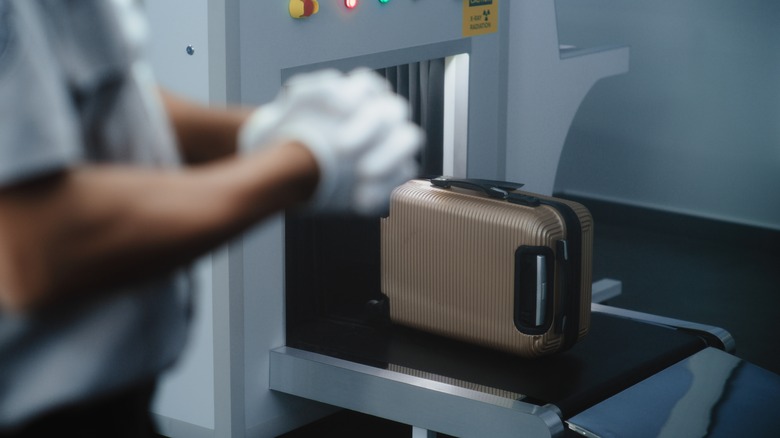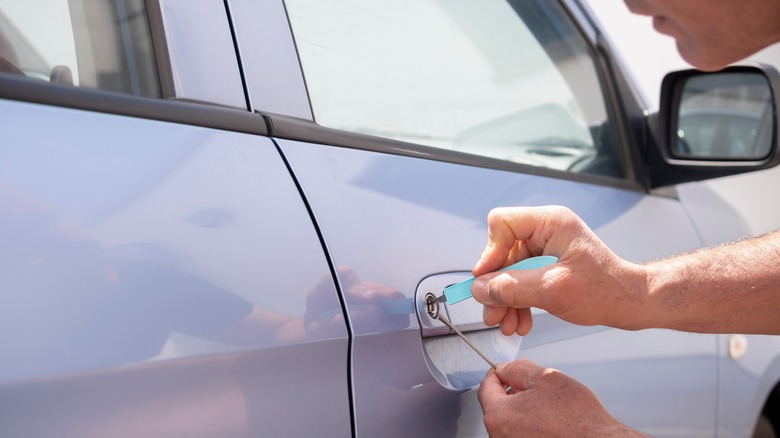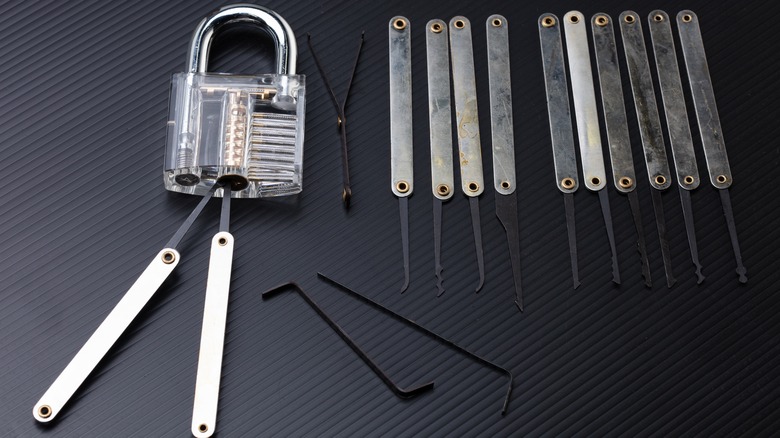The Odd Item TSA Doesn't Mind (But You Might Want To Check Local Laws)
Let's play a game: Which of these items do you think are allowed through airport security? A snow globe or a live owl? A Zippo lighter or Magic 8 Ball? Pool cues or a dead frog in a jar of formaldehyde? Whichever one you're guessing, it's probably the opposite — but don't fret, because the regulations and their supposed justifications can sound absolutely bonkers. We're not sure who decided to let you bring a living, breathing lobster through security, but it set a precedent for all airborne crustacean-lovers.
At first, lock picks would seem like an insane thing to allow in an airport, never mind a passenger jet. They're sharp, easy to conceal, and are literally designed for breaking into locked spaces. Thieves use lock picks, and probably a good number of terrorists have found them helpful as well. Why would anyone allow such nefarious little implements through one of the most rigorous types of security screening in the world? What is the Transportation Security Administration thinking?
Well, lock picks aren't that dangerous. These tools are small and not as sharp as they look. They wouldn't make effective weapons, at any rate. Meanwhile, there aren't many locks to pick in an airport, and there are none in a typical airplane cabin. There are many reasons travelers might want to bring these tools along, and not many reasons they shouldn't. If you run into any problems at all, it won't be TSA, but it might be the local authorities when you arrive at your destination.
Reasons you might need a lock pick
By some estimates, about 16,000 Americans get locked out of their homes or cars every day. When they call AAA or another service, the door doesn't magically open again; the person who arrives on the scene is frequently a locksmith, who uses special tools to unlock it. Yes, some cars can be unlocked remotely, and yes, digital interfaces are a different story, but professional locksmiths have plenty of work to do, helping clients get into old safes and into summer homes when they have long misplaced their keys. The art of picking locks is as old as locks themselves, and the vast majority of these doors are opened at the behest of their owners.
You also don't have to be a professional to carry locksmith tools. In most places in the U.S., the study of lock-picking is a perfectly legal hobby, as long as you're not messing around with locks you don't own. Learning how to pick locks is often considered an enriching STEM activity for both adults and children, as it develops logic, concentration, and hand-eye coordination skills. Like so many powerful tools, lock picks can be extremely helpful or malevolent, depending on their user, including all these TSA-approved self-defense weapons you can carry in your checked luggage. And lest you think lock picks are some kind of specialty equipment crafted by cartels and sold on the dark web, you can actually get a very decent set for $10 to $15 from Walmart, among other regular old stores.
Locksmith's tools are a legal gray area
Given so many legitimate reasons for carrying these tools, you should never run into a problem, right? Well, it's actually hard to say, because the rules vary by state. According to the Toool, a lock pickers' organization, most states have some kind of law about these items, while some have specific addenda, and a few states have no laws on the books at all. The exact legal language can be confusing for the everyday hobbyist, leading to more questions than answers. Take this excerpt from Illinois' 720 ILCS § 19-2: "A person commits the offense of possession of burglary tools when he possesses any key, tool, instrument, device, or any explosive, suitable for use in breaking into ... any depository designed for the safekeeping of property, or any part thereof, with intent to enter any such place and with intent to commit therein a felony or theft."
Only an attorney can offer you real legal advice, which pro locksmiths should probably consult. To laymen, most of these laws seem to boil down to the owner's intent, which would seem difficult to prove. Given all the ways these tools can be used, how do you prove someone with a lock-picking kit intends to burgle a house any more than someone with a baseball plans to hurl it through a window? That said, these kits also open the door to suspicion by law enforcement. TSA may let you through without a second glance, but local police might take a keener interest in your movements. Like these common medicines, you may want to think twice about traveling with them.


